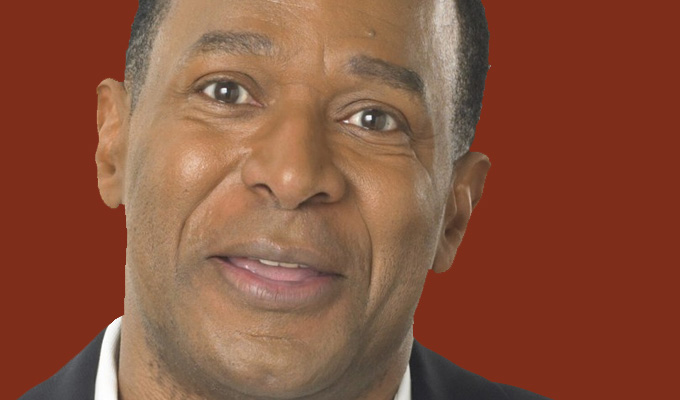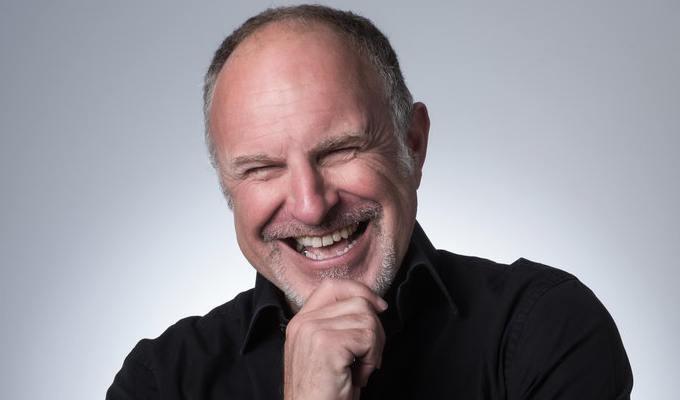
'Ethnic' comedy can be mainstream
A previously unpublished interview with Felix Dexter
In 2011, Felix Dexter performed what was to be his last tour, Multiple Personalities In Order. In this perviously unpublished interview, the comic, who died this weekend at the age of 52, spoke to Vicky Nangle about the show, about the Real McCoy and Bellamy’s People, and about TV commissioners’ reluctance to tackle anything that might be considered ‘ethnic’ comedy...There aren't that many people doing characters. What drew you to character comedy?
It's just my natural working posture. Many years ago when I did a show – this is going back to the mid-1990s now, embarrassingly – called The Real McCoy, the first ever TV thing I did. The director called me in and said: ‘We are very interested in the sort of character stuff we've seen you doing on the circuit and we hear you have the facility for that. Would you like to do some character stuff on the show?’ I said: ‘Yes! I've got loads of characters!’ But I only had one character, this boxer who thinks that boxing is actually very good and being hit in the head and being rendered unconscious is actually medically beneficial. I told him about that, and they said, “Could you really do that and write a script next week and we'll have a look at it?’ And then they said: ‘What else have you got?’ I sort of went: ‘Well really it's hard to know where to start...’
Were you ever tempted to go back to stand-up?
Well I'm not divorced from it or left it or f deserted it, it's something that I do in part of my existing shows.
When I did this show called Bellamy's People with Paul Whitehouse and Charlie Higson on BBC Two, obviously that was a character show. Three of the characters I did on there stuck out and were very very successful, so I took them to Edinburgh and put them in a one-man show, blended them in with stand-up. So it's not as if stand-up is over there in a foreign language.
It sounds as if stand-up is MCing the characters.
That's quite a nice little way of putting it. I had one review saying that there’s a slightly different feel to the show when I'm doing the stand-up to when I'm doing the characters, but that's quite a nice analogy. It isn’t entirely the compering thing though, because I don't get jealous if the character goes very well and try and outdo them. I don't hog the limelight, y'know.
Do you find that your friends think your characters are based on them?
No, but I do get people saying oh that's a bit like so-and-so. In fact, that happens with one of my favourite characters Aubrey Duboisson, hotel management, lives somewhere in the Cotswolds. Frequently I have people saying: ‘Seriously, I've got a friend who comes from Barbados who was adopted, and he was exactly like that, y'know, it's quite uncanny.’
Bellamy's People proved really popular with the critics, why do you think that it didn't get a second series?
Well now you're asking me to go into the complications of commissioning and BBC politics, I can't really explain it. It was really groundbreaking, We're doing another few Down The Lines in January, the radio show out of which Bellamy's People came. We enjoyed doing that and doing a fresh type of comedy, a new format. It’s a new way of approaching character comedy, which is basically what it is, but we were also just doing crazy nutty characters make no sense, out of nowhere but our imagination, just really brilliant, a new concept of comedy.
Why we didn't do it again, it's a mystery to us. Part of it, a possible explanation is the viewing figures. But that again was down to the fact that it was new and also I don't think the marketing of it was very good.
You mentioned The Real McCoy, which was a predominantly black sketch show. Do you think issues of race and comedy have changed much since then?
They have done. I think there is a greater willingness to look at somebody globally and not categorise them as black or a particular ethnicity. There is a greater willingness to do that than there was certainly since The Real McCoy. But – this is also a slight contradiction – there is also a lack of willingness maybe to look at the appeal there may be in the broader sense of ethnic-type comedy to a wider audience.
For instance, I think there is still ethnic-type comedy which initially looks like an ethnic show that still might win a very, very broad appeal. Just in the same way you get to that love scene and people will watch that, even it's set in a Scottish town and people don't understand what's going on, they're still drawn to it even though it's very specific and ethnically distinct.
It's funny and I think that somehow it's got lost, the fact that specifically ethnic-type comedy can have a very broad appeal. Given also the demographic now, virtually everybody, particularly the youth, encounter people from a very wide range of ethnicity.
A really silly question now, what did you want to be when you grew up?
Well initially, I had aspirations that I was going to be one of the most eloquent and devastating barristers – or certainly performers in the courtroom – in the history of the law.
And what stopped you?
Oh we'll have to have another interview for that! I did a law degree and I did bar exams and then I fell in love with this American Woman and I went over there half way through my bar finals I came back and started doing comedy and I thought oh this is actually quite fun.
You could’ve been possibly like Aubrey Duboisson in the Cotswolds then?
Oh dear... not quite as extreme as him but yes. It's slightly scary to think that there are elements of me in there a little bit. [laughing]
Published: 21 Oct 2013






